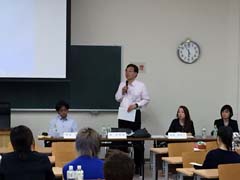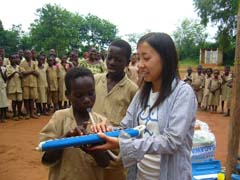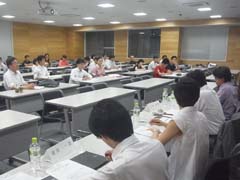6th JOCV Research Seminar Focuses on the Character of JOCVs
2015.08.03
On July 16 and 17, 2015, JICA Research Institute, Tohoku University Graduate School of Law and JICA Tohoku held the 6th Japan Overseas Cooperation Volunteers (JOCV) Research Seminar in Sendai. Since 2012, JICA-RI has been conducting research analyzing JOCV programs from a range of academic perspectives, including political science, economics, anthropology and psychology, and it holds public seminars to disseminate its findings. This is the second seminar held outside of Tokyo - the first was the seminar held at JICA Kansai in Kobe.
The Tohoku region in northeast Japan suffered severe damage from the 2011 Great East Japan Earthquake. Sendai is the largest city in the region. Tohoku University has worked on various research activities for the reconstruction. A number of ex-JOCVs have been engaged in the reconstruction as well.
The theme of the seminar was "Japan Overseas Cooperation Volunteers and the Character of Volunteers." Under the moderation of Tohoku University Professor and JICA-RI Visiting Fellow Yasunobu Okabe, the seminar introduced studies into the connection between volunteers' motivation for participating and program objectives, and what kinds of changes JOCVs' activities bring about within the volunteers.

JICA-RI Director Ichiro Tambo
(second from left)
The first day of the seminar was mainly aimed at students, and covered what JOCVs are and what the program actually does. First, Eriko Sakamaki, a JICA-RI staff member and a former volunteer, gave an overview of JOCVs, and spoke about her own experiences as a volunteer.
Next, former JICA-RI Research Fellow Sakiko Shiratori used the findings of an awareness survey of volunteers to categorize the character of volunteers, and discuss the connection between their motivation for participating and the objectives of JOCV projects. The three objectives of JOCV programs are (1) assisting in the development of developing countries, (2) deepening mutual understanding, and (3) fostering a global perspective of participating Japanese youth. Sakiko Shiratori analyzed in relation to these objectives and volunteers' motivation that (1) wanting to help developing countries and their people corresponds to the first objective, (2) wanting to understand developing countries and experience life overseas corresponds to the second objective, and (3) wanting to do work that would improve their career prospects and bring about a change within themselves corresponds to fostering a global perspective.

A volunteer in service in Benin
In the final session of the first day, Yasunobu Okabe spoke about the establishment and history of JOCV with a presentation entitled "50 Years of Japan Overseas Cooperation Volunteers - Establishment and Growth." JICA-RI Director Ichiro Tambo talked as a panelist about the multifaceted nature of JOCV programs and the research significance thereof, and a lively question-and-answer session followed. About 70 people attended the first day of the seminar, and among the comments at the end were "I've never had the opportunity to hear about the experiences of a volunteer, and it was very interesting," and "The talks covered many different aspects and were very informative."
The second day of the seminar was primarily aimed at people with a connection to JOCVs, including former volunteers, those involved in reconstruction of Tohoku, where an earthquake and tsunami hit in 2011, and government officials. Kazuya Suda, a former research assistant at JICA-RI, gave a presentation entitled "Categorization of Japan Overseas Cooperation Volunteers by Motivation - Six Volunteer Profiles," and Research Fellow Mayuko Onuki presented the "Interim Result of Analysis on Returned Volunteers."
Volunteer categorization was based on the survey used in the first day, but analysis focused more attention on typical volunteer personalities and awareness for each category. The analysis presented by Kazuya Suda revealed that (1) "charity-oriented" volunteers who want to help people have a high intention of continuing their activities after they return to Japan and providing assistance to developing countries, and have trust in others; (2) "self-discovery-oriented" volunteers who want to experience life overseas have a low intention of continuing their activities after they return to Japan, have a low level of interest in domestic and overseas issues, and view volunteer activities for their own benefit; and (3) "self-transformation-oriented" volunteers who want to do work that brings about a change within themselves tend to be those who quit their full-time jobs, and, with little experience of developing countries, feel a degree of uncertainty.

The second day of the seminar
The research by Mayuko Onuki explored the kinds of changes that volunteers underwent as a result of their activities, and analyzed JOCV programs from a global human resources development perspective. The Ministry of Economy, Trade and Industry of Japan defines global human resources as individuals who have (1) foreign language and communication skills, (2) understanding of different cultures and an ability to apply it in multicultural work settings, and (3) fundamental work competencies as a productive member of the community. Onuki examined changes in the fundamental work competencies of volunteers before, during and after their overseas service, and found that their ability to work as part of a team improved, as did their initiative and ingenuity. Onuki also explained that the greater the improvement of fundamental work competencies during their overseas service, the greater the extent to which volunteer action plans were implemented and the lower the level of stress experienced. Furthermore, volunteers who improved listening skills, flexibility and an ability to control stress experienced fewer problems with local colleagues and bosses in their host country during the service.
Executive Advisor to the Director General Hiroto Mitsugi, Secretariat of JICA's Japan Overseas Cooperation Volunteers, who was on the panel, kicked off the discussion session with the question "Would the findings change if categorization were by job type?" Many questions centered on research method and research content were also brought up by participants. About 30 people attended the second day of the seminar, and among the comments at the end were "I wasn't aware there was this kind of research done. It was very interesting" and "The analysis was objective and specialized, and was very well done."
JICA-RI Visiting Fellow Yasunobu Okabe says, "This Sendai seminar, as well as the seminar in Kobe last year, worked in an effective way to respond to those who live outside the areas around Tokyo with interests in JOCV and development assistance, or even in a way to expand their interests."

事業事前評価表(地球規模課題対応国際科学技術協力(SATREPS)).国際協力機構 地球環境部 . 防災第一チーム. 1.案件名.国 名: フィリピン共和国.

事業事前評価表(地球規模課題対応国際科学技術協力(SATREPS)).国際協力機構 地球環境部 . 防災第一チーム. 1.案件名.国 名: フィリピン共和国.

事業事前評価表(地球規模課題対応国際科学技術協力(SATREPS)).国際協力機構 地球環境部 . 防災第一チーム. 1.案件名.国 名: フィリピン共和国.

事業事前評価表(地球規模課題対応国際科学技術協力(SATREPS)).国際協力機構 地球環境部 . 防災第一チーム. 1.案件名.国 名: フィリピン共和国.

事業事前評価表(地球規模課題対応国際科学技術協力(SATREPS)).国際協力機構 地球環境部 . 防災第一チーム. 1.案件名.国 名: フィリピン共和国.
scroll